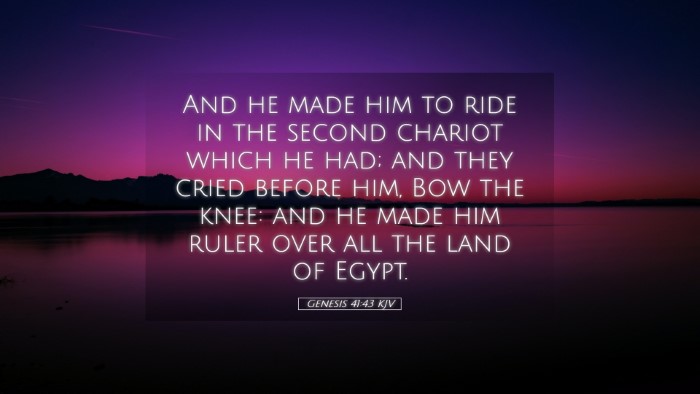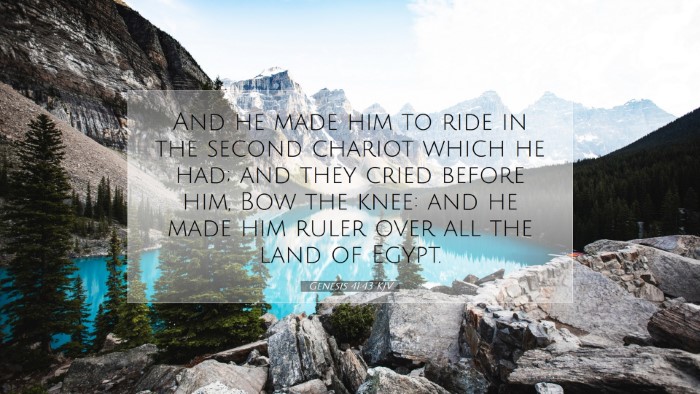Commentary on Genesis 41:43
Genesis 41:43 states, "And he made him to ride in the second chariot which he had; and they cried before him, Bow the knee: and he made him ruler over all the land of Egypt." This verse captures a pivotal moment in Joseph’s story, highlighting his rise from prisoner to the second most powerful man in Egypt. This commentary synthesizes insights from prominent public domain commentators to provide a multi-faceted understanding of this significant event.
Contextual Background
The chapter presents the culmination of Joseph's journey from the pit to the palace. After interpreting Pharaoh’s dreams, which foretold seven years of abundance followed by seven years of famine, Joseph was appointed as the governor of Egypt. This verse serves as a transition into his new role.
The Significance of the Chariot
Matthew Henry emphasizes the importance of the chariot as a symbol of Joseph's elevated status. Pharaoh honored Joseph by granting him a position of prominence, riding in the second chariot, a privilege only bestowed to those of high rank. This position illustrated not only authority but also the confidence Pharaoh had in Joseph’s abilities to handle the coming crisis.
Albert Barnes adds that the second chariot signifies Joseph’s closeness to the throne, marking a dramatic shift from his past suffering. This act of riding alongside Pharaoh indicates his authority and the trust placed in him, which speaks volumes about his character and aptitude as a leader.
The Decree of "Bow the Knee"
The proclamation, "Bow the knee," highlights the reverence that Joseph commanded upon his appointment. Adam Clarke points out that this might also symbolize the Egyptians' acknowledgment of a foreigner in power, showcasing God’s providence in elevating Joseph despite his background. It also implies that Joseph's wisdom warranted respect and submission from the people.
-
Leadership Amidst Adversity:
Joseph's rise teaches valuable lessons regarding leadership, particularly in times of distress. His experience in slavery and imprisonment molded him into a leader who could empathize with the suffering of others.
-
Divine Providence:
The rapid shift in Joseph's fortune reiterates the theme of divine providence. Matthew Henry notes that God’s plans often unfold through unexpected avenues, reminding believers that God is in control even during our darkest hours.
The Role of Joseph as a Ruler
Joseph's appointment as ruler over all of Egypt carries profound implications. He was not merely an administrator but a savior figure, tasked with navigating the nation through impending famine. Albert Barnes articulates that this role required wisdom beyond earthly measures, underpinning how Joseph's spirituality informed his governance.
Adam Clarke further elucidates that Joseph’s ability to interpret dreams was not merely for personal gain but equipped him to serve Egypt and the surrounding nations effectively. This aspect of service echoes the biblical mandate to exercise authority with humility and care.
Theological Implications
This narrative encapsulates the overarching biblical theme of restoration. From despair to dignity, Joseph's elevation serves as a typology of Christ, who also experienced suffering before entering His glory. Matthew Henry draws parallels by indicating how Christ's path of suffering leads ultimately to exaltation, mirroring Joseph's story.
Practical Applications for Believers
For pastors, theologians, and students, the lessons derived from Genesis 41:43 are manifold:
-
Patience in Suffering:
Like Joseph, believers are encouraged to maintain faith in God during trials, trusting in His sovereign timing for elevation and purpose.
-
Embrace of God-given Opportunities:
When God presents opportunities, they must be seized with readiness and faithfulness, just as Joseph did when Pharaoh called upon him.
-
Servant Leadership:
The call to lead should always be intertwined with the responsibility to serve, echoing Joseph’s role in preserving life during a time of need.
Conclusion
Genesis 41:43 stands as a testament to God's intricate plan through the life of Joseph. Through his experiences and subsequent exaltation, we witness the interplay of human agency and divine sovereignty. As we reflect on this narrative, let us embrace the truth that God is at work, even in our most challenging circumstances, preparing us for greater purposes.


